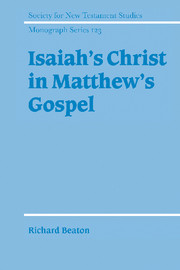
- Cited by 5
-
Cited byCrossref Citations
This Book has been cited by the following publications. This list is generated based on data provided by Crossref.
Bockmuehl, Markus and Hagner, Donald A. 2005. The Written Gospel.
Hays, Christopher B. 2011. The Book of Isaiah in Contemporary Research. Religion Compass, Vol. 5, Issue. 10, p. 549.
2012. Matthew. p. 31.
Watts, Rikk 2015. Messianic Servant or the End of Israel’s Exilic Curses? Isaiah 53.4 in Matthew 8.17. Journal for the Study of the New Testament, Vol. 38, Issue. 1, p. 81.
Botner, Max 2019. Jesus Christ as the Son of David in the Gospel of Mark.
- Publisher:
- Cambridge University Press
- Online publication date:
- September 2009
- Print publication year:
- 2002
- Online ISBN:
- 9780511487842
- Series:
- Society for New Testament Studies Monograph Series (123)




